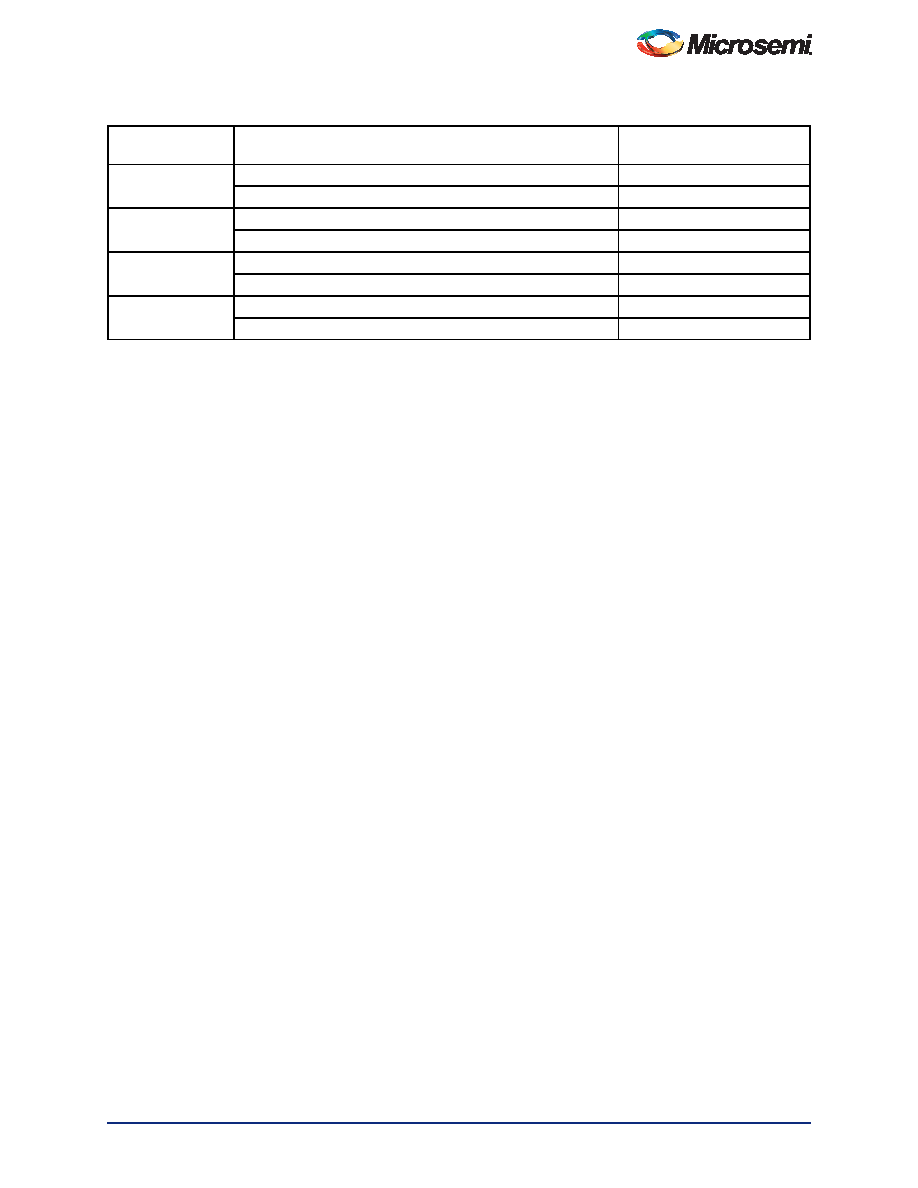- 您現(xiàn)在的位置:買賣IC網(wǎng) > PDF目錄4514 > M1A3P250-1PQ208I (Microsemi SoC)IC FPGA 1KB FLASH 250K 208-PQFP PDF資料下載
參數(shù)資料
| 型號: | M1A3P250-1PQ208I |
| 廠商: | Microsemi SoC |
| 文件頁數(shù): | 79/220頁 |
| 文件大小: | 0K |
| 描述: | IC FPGA 1KB FLASH 250K 208-PQFP |
| 產(chǎn)品變化通告: | A3P250,A3P125 Wire Change 12/jan/2012 |
| 標(biāo)準(zhǔn)包裝: | 24 |
| 系列: | ProASIC3 |
| RAM 位總計: | 36864 |
| 輸入/輸出數(shù): | 151 |
| 門數(shù): | 250000 |
| 電源電壓: | 1.425 V ~ 1.575 V |
| 安裝類型: | 表面貼裝 |
| 工作溫度: | -40°C ~ 85°C |
| 封裝/外殼: | 208-BFQFP |
| 供應(yīng)商設(shè)備封裝: | 208-PQFP(28x28) |
第1頁第2頁第3頁第4頁第5頁第6頁第7頁第8頁第9頁第10頁第11頁第12頁第13頁第14頁第15頁第16頁第17頁第18頁第19頁第20頁第21頁第22頁第23頁第24頁第25頁第26頁第27頁第28頁第29頁第30頁第31頁第32頁第33頁第34頁第35頁第36頁第37頁第38頁第39頁第40頁第41頁第42頁第43頁第44頁第45頁第46頁第47頁第48頁第49頁第50頁第51頁第52頁第53頁第54頁第55頁第56頁第57頁第58頁第59頁第60頁第61頁第62頁第63頁第64頁第65頁第66頁第67頁第68頁第69頁第70頁第71頁第72頁第73頁第74頁第75頁第76頁第77頁第78頁當(dāng)前第79頁第80頁第81頁第82頁第83頁第84頁第85頁第86頁第87頁第88頁第89頁第90頁第91頁第92頁第93頁第94頁第95頁第96頁第97頁第98頁第99頁第100頁第101頁第102頁第103頁第104頁第105頁第106頁第107頁第108頁第109頁第110頁第111頁第112頁第113頁第114頁第115頁第116頁第117頁第118頁第119頁第120頁第121頁第122頁第123頁第124頁第125頁第126頁第127頁第128頁第129頁第130頁第131頁第132頁第133頁第134頁第135頁第136頁第137頁第138頁第139頁第140頁第141頁第142頁第143頁第144頁第145頁第146頁第147頁第148頁第149頁第150頁第151頁第152頁第153頁第154頁第155頁第156頁第157頁第158頁第159頁第160頁第161頁第162頁第163頁第164頁第165頁第166頁第167頁第168頁第169頁第170頁第171頁第172頁第173頁第174頁第175頁第176頁第177頁第178頁第179頁第180頁第181頁第182頁第183頁第184頁第185頁第186頁第187頁第188頁第189頁第190頁第191頁第192頁第193頁第194頁第195頁第196頁第197頁第198頁第199頁第200頁第201頁第202頁第203頁第204頁第205頁第206頁第207頁第208頁第209頁第210頁第211頁第212頁第213頁第214頁第215頁第216頁第217頁第218頁第219頁第220頁

ProASIC3 Flash Family FPGAs
Revision 13
2-3
I/O Power-Up and Supply Voltage Thresholds for Power-On Reset
(Commercial and Industrial)
Sophisticated power-up management circuitry is designed into every ProASIC3 device. These circuits
ensure easy transition from the powered-off state to the powered-up state of the device. The many
different supplies can power up in any sequence with minimized current spikes or surges. In addition, the
I/O will be in a known state through the power-up sequence. The basic principle is shown in Figure 2-1
There are five regions to consider during power-up.
ProASIC3 I/Os are activated only if ALL of the following three conditions are met:
1. VCC and VCCI are above the minimum specified trip points (Figure 2-1 on page 2-4).
2. VCCI > VCC – 0.75 V (typical)
3. Chip is in the operating mode.
VCCI Trip Point:
Ramping up: 0.6 V < trip_point_up < 1.2 V
Ramping down: 0.5 V < trip_point_down < 1.1 V
VCC Trip Point:
Ramping up: 0.6 V < trip_point_up < 1.1 V
Ramping down: 0.5 V < trip_point_down < 1 V
VCC and VCCI ramp-up trip points are about 100 mV higher than ramp-down trip points. This specifically
built-in hysteresis prevents undesirable power-up oscillations and current surges. Note the following:
During programming, I/Os become tristated and weakly pulled up to VCCI.
JTAG supply, PLL power supplies, and charge pump VPUMP supply have no influence on I/O
behavior.
PLL Behavior at Brownout Condition
Microsemi recommends using monotonic power supplies or voltage regulators to ensure proper power-
up behavior. Power ramp-up should be monotonic at least until VCC and VCCPLLX exceed brownout
activation levels. The VCC activation level is specified as 1.1 V worst-case (see Figure 2-1 on page 2-4
for more details).
When PLL power supply voltage and/or VCC levels drop below the VCC brownout levels (0.75 V ± 0.25
V), the PLL output lock signal goes low and/or the output clock is lost. Refer to the "Power-Up/-Down
Behavior of Low Power Flash Devices" chapter of the ProASIC3 FPGA Fabric User’s Guide for
information on clock and lock recovery.
Table 2-4 Overshoot and Undershoot Limits 1
VCCI and VMV
Average VCCI–GND Overshoot or Undershoot
Duration as a Percentage of Clock Cycle2
Maximum Overshoot/
Undershoot2
2.7 V or less
10%
1.4 V
5%
1.49 V
3 V
10%
1.1 V
5%
1.19 V
3.3 V
10%
0.79 V
5%
0.88 V
3.6 V
10%
0.45 V
5%
0.54 V
Notes:
1. Based on reliability requirements at 85°C.
2. The duration is allowed at one out of six clock cycles. If the overshoot/undershoot occurs at one out of two cycles, the
maximum overshoot/undershoot has to be reduced by 0.15 V.
3. This table does not provide PCI overshoot/undershoot limits.
相關(guān)PDF資料 |
PDF描述 |
|---|---|
| A3P250-1PQG208I | IC FPGA 1KB FLASH 250K 208-PQFP |
| A3P250-1PQ208I | IC FPGA 1KB FLASH 250K 208-PQFP |
| M1A3P250-1PQG208I | IC FPGA 1KB FLASH 250K 208-PQFP |
| ASM31DTMH | CONN EDGECARD 62POS R/A .156 SLD |
| A40MX02-PL68 | IC FPGA MX SGL CHIP 3K 68-PLCC |
相關(guān)代理商/技術(shù)參數(shù) |
參數(shù)描述 |
|---|---|
| M1A3P250-1PQG144 | 制造商:ACTEL 制造商全稱:Actel Corporation 功能描述:ProASIC3 Flash Family FPGAs |
| M1A3P250-1PQG144ES | 制造商:ACTEL 制造商全稱:Actel Corporation 功能描述:ProASIC3 Flash Family FPGAs |
| M1A3P250-1PQG144I | 制造商:ACTEL 制造商全稱:Actel Corporation 功能描述:ProASIC3 Flash Family FPGAs |
| M1A3P250-1PQG144PP | 制造商:ACTEL 制造商全稱:Actel Corporation 功能描述:ProASIC3 Flash Family FPGAs |
| M1A3P250-1PQG208 | 功能描述:IC FPGA 1KB FLASH 250K 208-PQFP RoHS:是 類別:集成電路 (IC) >> 嵌入式 - FPGA(現(xiàn)場可編程門陣列) 系列:ProASIC3 標(biāo)準(zhǔn)包裝:152 系列:IGLOO PLUS LAB/CLB數(shù):- 邏輯元件/單元數(shù):792 RAM 位總計:- 輸入/輸出數(shù):120 門數(shù):30000 電源電壓:1.14 V ~ 1.575 V 安裝類型:表面貼裝 工作溫度:-40°C ~ 85°C 封裝/外殼:289-TFBGA,CSBGA 供應(yīng)商設(shè)備封裝:289-CSP(14x14) |
發(fā)布緊急采購,3分鐘左右您將得到回復(fù)。